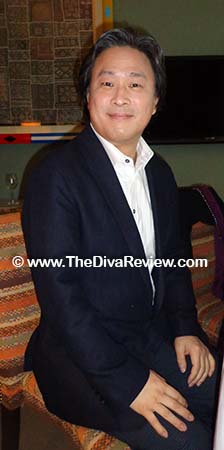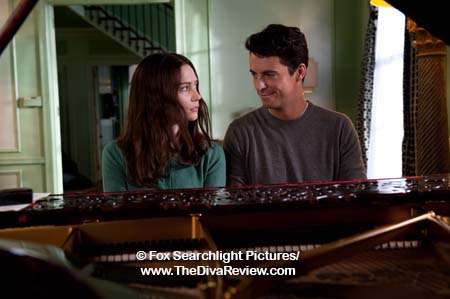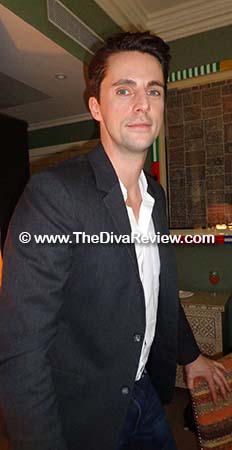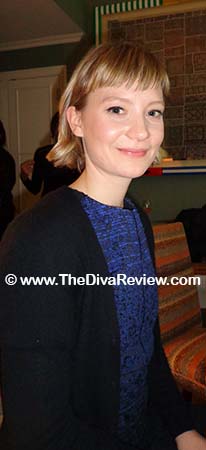
Hey boys and girls, we had the extreme pleasure of an exclusive interview with one of the deities of modern filmmaking, the man who revolutionised Korean cinema with a hammer blow to the audience called Oldboy. Director Chan-wook Park - assisted by his excellent translator/producer Mr. Wonjo Jeong - spoke with us about his first English-language film, the sumptuously creepy Stoker.
If you donít mind an abundance of major plot spoilers aheadÖ
Dig it!
Stoker
Chan-wook Park
 The
Lady Miz Diva: Stoker is one of your most visually beautiful films.
Did having your longtime collaborator, cinematographer Chung Chung-hoon
working with you any particular help on this first journey into
English-language film?
The
Lady Miz Diva: Stoker is one of your most visually beautiful films.
Did having your longtime collaborator, cinematographer Chung Chung-hoon
working with you any particular help on this first journey into
English-language film?
Chan-wook Park: The first thing I would like to say about this is for a very personal and emotional reason, in a situation where you can imagine Iíd find myself very lonely; to have somebody I was very close to was a very reassuring thing. Of course, there was Wonjo {Jeong}, but Wonjo was one of the co-producers, but being in the producer department means that he was one of the enemies. Even though he was another familiar face, I had to rely on Chung-hoon.
{Both C-wP and Wonjo Jeong laugh}
C-wP: AnyhooÖ And creatively speaking, to have somebody who Iíve been collaborating with for a long time, especially when I find myself on a film set where everything had to happen at a much faster pace, I had to have somebody who I was familiar with; we know each other very well. If it wasnít for that fact, I wouldnĎt have been able to finish this film in the 40-day shoot that it was.
LMD: In your Korean films, youíre known for pushing the envelope with regard to violence and sexuality. Stoker felt more restrained. I wondered this film had been made in Korea or with a Korean company, would it have been any different?
C-wP: To tell you the short answer first, no, it would have been exactly the same. Not only is it to do with the fact that at the center of it, the protagonist is a young girl. To expand on that, to have the audience coming to see this film, young girls Indiaís age; I didnít want to make a film where they would frown and be put off by the violence and other extreme expression. Thatís why I exercised restraint myself. My ultimate goal was to create something that was aesthetically elegant and something that teenage girls Indiaís age would find to be beautiful.
 LMD:
A lot of people who know your previous work may immediately think that
Stoker is a revenge story. I saw it as more of an origin story, almost
like a superhero; a story of becoming. In some ways it reminded me of
Kafkaís Metamorphoses.
LMD:
A lot of people who know your previous work may immediately think that
Stoker is a revenge story. I saw it as more of an origin story, almost
like a superhero; a story of becoming. In some ways it reminded me of
Kafkaís Metamorphoses.
C-wP: Youíre absolutely right. But also the film lends itself perfectly to other interpretations just as equally, too. So all those viewpoints; I would have to say theyíre all right
LMD: But how did you see it?
C-wP: To me, these interpretations are all equally important and precious. If somebody wanted to see this film as a tale of vengeance; itís perfectly fine for them to see it as such. Because when you see little Charlie, who murders his baby brother, Jonathan, he does it out of - in a way - a vengeful act for taking all the affection of his older brother, Richard, away from himself. So you could see that as a vengeful act. Also, Uncle Charlie killing Richard, his older brother like that, you could interpret that as a vengeful act for incarcerating him in an institution for his entire life. You could also see Indiaís killing of Uncle Charlie as much as a revenge against her fatherís murder.
I donít intend to do a sequel to this film, but itís also equally pertinent that you could see this as ďIndia begins,Ē as it were. And this idea of metamorphosis is always at the core of all my filmmaking. Itís a very important influence.
 LMD:
It raises the question as to whether someone can be born evil. Is that
part of the study of Stoker?
LMD:
It raises the question as to whether someone can be born evil. Is that
part of the study of Stoker?
C-wP: Well, you could see this film from that perspective, it is true, but I would like to suggest the possibility of seeing it in a different light: Because when you look at the character of India, if she hadnít met Uncle Charlie, do you think she could have become that evil if Uncle Charlie hadnít paid that visit? Do you think she wouldíve become a murderess? It may be an entirely different question, but even though the DNA mightíve been very much a part of her, if she wasnít stimulated and that side of her wasnít developed by Uncle Charlie, she mightíve ended up just being an ordinary girl.
When I was writing the opening voiceover narration from India, the thing that was in the back of my mind was that this was Indiaís excuse for doing what she is doing. When she talks about ďA person cannot determine their own identity,Ē and she alludes to how a flower cannot choose its own colour, she is offering an excuse to all her violence and evil behaviour.
LMD: Can you tell us about your conversation with Josh Brolin regarding his starring in the Oldboy remake?
C-wP: What had actually happened is that Josh Ė such a sweet man, Josh Brolin Ė is the one who asked for my blessing. He was saying, ďDirector Park, I am doing this film, Spike Leeís remake of Oldboy and I would like to ask for your blessing.Ē He was so sweet. And I had never met Josh, but we had a really nice conversation on the phone years before this Oldboy remake and ever since, we had mutual respect for each other. And I felt it was so kind of him to have asked for my blessing. Because of that, I gave him my utmost, my best blessing.
LMD: What are you working on next? Thereís been word about a Western youíre interested in. Will it be a straight US Western or something closer to Kim Ji-woonís The Good, The Bad and The Weird?
C-wP: Iím thinking of doing a Western in the US, or to put it more correctly, if I am to do a Western, I am thinking of doing it in the US. It is something that Iíve heard before; it may not necessarily end up being my next film, but I would like to just say that it is ultimately something that I would like to do, make a Western in the US. As far as something coming up next; itís not confirmed. Itís maybe or maybe not, so Iíd rather not say.
~ The Lady Miz Diva
Feb 28th 2013
Bonus features:
We also attended the Stoker press roundtables and got in a few questions for stars Matthew Goode and Mia Wasikowska.
Matthew Goode
 The
Lady Miz Diva: How did you read Charlie, specifically his relationship
to India; is she a relative, a lover, a protťgť? And can you talk about
something this film explores; whether evil is inherent. Are people born
evil?
The
Lady Miz Diva: How did you read Charlie, specifically his relationship
to India; is she a relative, a lover, a protťgť? And can you talk about
something this film explores; whether evil is inherent. Are people born
evil?
Matthew Goode: Absolutely. I mean, itís all about what Director Park called bad blood and the idea whether itís predisposition or in the family bloodline to do these acts And Charlie, my whole thing with him was heís isolated, heís lonely. Thatís one of the things Ö itís not a vampire film, but there are sort of things about it which are similar in the idea of it that he is trapped in the past for me and never really grew up: The boy who didnít really grow up. And so you wanted to get the confusion for me for an audience of very masculine and adult, but almost an innocence to him in his own little world. Because of Mrs. McGarrick, he mustíve heard that this niece is like him and that for him is very powerful, and heís like, ĎThereís someone like me. Iím finally not alone in the world.í We didnít seek to answer every question, cos I think audiences are far more intelligent and I think it gets very boring when itís like, íthis is concrete,í and with these kind of emotions and these kind of complex psychologies, I donít think you can answer all those questions. So, it never got to the length of it becoming a sexual relationship, but there is no doubt as you see when Indiaís in the shower, there is and there always has been a very strong link between sex and violence, and who knows what mightíve happened? And I think what itís suggesting also is that each generation, they become slightly stronger and more intelligent, and she sees Charlie as being - although attracted to him and almost a tutor - that he needs to go, really, ultimately.
Mia Wasikowska
 The
Lady Miz Diva: I would love to know what your take on India was when you
first read her and her relationship to Charlie?
The
Lady Miz Diva: I would love to know what your take on India was when you
first read her and her relationship to Charlie?
Mia Wasikowska: Well, thereís a part of India that I understand; the more universal side of her which is the feeling of loneliness or desire that are more common to teenagers and anyone, really. And then thereís a part of her thatís still a mystery to me, but it just goes back to the basics of acting; imagining, pretending, and thinking. But yeah, the thing I liked most about reading the script was that you sort of feel like sheís walking on this thin line and youíre not quite sure which way sheís gonna go. Is she gonna be a hero or an anti-hero? And that was cool for me cos you donít quite know how she is until the end.
And the dynamic between her and Charlie, as a very isolated person, I think it was the first time sheís ever had an experience of somebody knowing her, and in turn, her knowing someone, and thereís a real connection there that is very foreign for her and something that I think sheís excited by, but also fearful of. And again, you donít quite know whoís in control of that dynamic between the two of them. Whoís the hunted and whoís the hunter?
LMD: Had you seen Director Parkís work before you took on the role?
MW: No, Iíd heard of him and Iíd heard of Oldboy, but I hadnít seen his films. When I signed on, I did a marathon.
LMD: Whatís your favourite?
MW: Iím gonna go with Oldboy, but theyíre all great in different ways.
 LMD:
What did Charlie sending India the shoes every year symbolise?
LMD:
What did Charlie sending India the shoes every year symbolise?
MW: I think it sort of explains something of his character in an obsessive kind of thing in him to send her shoes every year on her birthday that are the right size for her, that fit her every year. And then itís also symbolic when he brings her on her 18th birthday, high heels instead of saddle shoes; it symbolises her girl- to-woman- hood. And thereís a saying in Korean, which Director Park told me, which translates to something like, ĎDonít give somebody you love shoes, or theyíll run away.í I think thatís quite nice, especially for this.
~ The Lady Miz Diva
Feb 28th 2013
© 2006-2022 The Diva Review.com
|
|

























